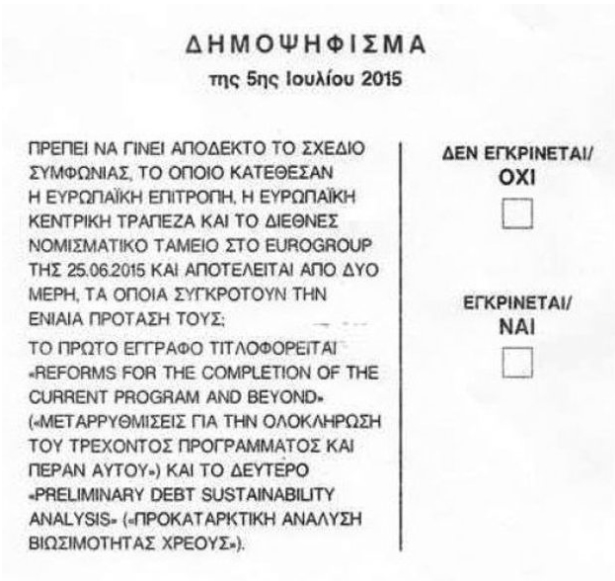On Sunday, citizens of Greece will be presented with the following question when they enter the ballot box as they vote on the bailout referendum.
(Image source: BBC)
In case you can’t read Greek, here’s a translation:
Referendum of the 5th of July 2015
Should the plan of agreement be accepted, which was submitted by the European Commission, the European Central Bank, and the International Monetary Fund in the Eurogroup of 25.06.2015 and comprises of two parts, which constitute their unified proposal?
The first document is entitled “Reforms For The Completion Of The Current Program And Beyond and the second “Preliminary Debt Sustainability Analysis.”
NOT ACCEPTED / NO
ACCEPTED / YES
The confusingly worded paper – to the point where very little detail of what citizens are actually voting for is given – is only overshadowed by the fact the “NO” box (favoured by the Greek government) is positioned prominently above the “YES” box.
Naturally, scorn on Twitter prevailed:
 (Image Source: Business Insider UK)
(Image Source: Business Insider UK)
(Image source: BBC)
If the wording of the referendum wasn’t confusing enough, and the design of the ballot paper not so controversially formatted, there is even a key mistranslation in one of the supporting documents that Greeks are being asked to vote on.
The Greek version of the “Preliminary Debt Sustainability for Greece,” which lays out creditors’ expectations for the development of Greece’s debt load between now and 2030, is missing a “no” in a sentence describing whether the country’s debt is sustainable.
While the English original says that Greece’s gross financing need in coming years “points to no sustainability issues under the first two scenarios,” the Greek version says it “points to sustainability issues.”
The error was first reported by Bloomberg:
“There are three scenarios, and the document’s conclusion is that under the first two there are “no sustainability issues” when the country’s financing needs are taken into account. The official translation provided by the Foreign Ministry and sent to reporters on Monday, though, was missing the word “no.” So the Greek text reads that there is a sustainability issue.
“In addition, Greek parliament minutes show that a separate draft translation provided to lawmakers before they were asked to approve the referendum also dropped this crucial “no.” Spokespersons from the interior and foreign ministries declined to comment on the error.”
With less than 4 days left before Greeks have to decide whether or not they are going to side with their government and reject even more austerity, it seems that the citizens of Greece would do well to spend the time remaining brushing up on their English in order to understand exactly what they’re voting for.






